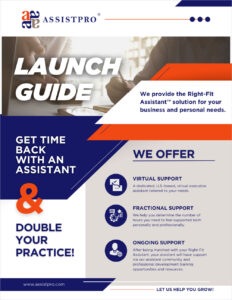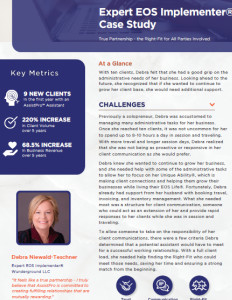We’ve had many clients ask us, “what is the best way to communicate with my assistant?” or “tell me the best way, and I’ll do it”. But there is only one answer: it’s personal.
The way you communicate best with your assistant is going to look very different than the next coach, consultant, or entrepreneur. Everyone has a different style, and a different mode to deliver and download information.
Do You Prefer to Talk, Read, or Listen?
I’ve found the best way for me to communicate with my assistant is through voice memos or short videos.
Fractional little audio messages that are quick and off-the-cuff. This is how I download information best as well. Or I will use Loom videos, often 5 minutes long or less.
While another person on our team, Faustina, our integrator, loves email checklists and Trello boards… because that’s her love language, right? But that will make my eyes cross and not want to even come to work!
There is a clear difference between our communication preferences, and therefore we need very different assistants.
So, do you prefer to talk, read, or listen?
“The number one thing with communicating with your assistant is making sure that you can communicate with them the best way for you.” – Jenna Spencer, AssistPro Founder
But you also have to make sure you can work with your assistant in a way that you can also download information from them.
It goes both ways, making sure your assistant is great at downloading and receiving the way you like to give information.
You can have a different structure with your assistant than the next person, what works for one client is not going to be the same for the next, it’s a very personal thing. The delegation process, which should be your next big focus after nailing down communication, is entirely personal.
Communication & Delegation… It’s Personal!
There is no magic formula or agenda for communicating well with your assistant, and the same goes for delegation. When you approach delegation, you are handing off tasks that you’ve probably been doing yourself for a very long time.
To even consider delegating a task will first and foremost require trust. If you can’t trust your assistant to manage responsibilities for you – to take more than just tasks off your plate, but entire workflows and decision-making processes – then you won’t be able to delegate effectively.
Sometimes it’s thinking about how to let your assistant do something for you, “it would be great if my assistant could do this for me” but clients tend to hinder themselves from delegating tasks because they haven’t figured out how it could work in their minds.
That is where the power of delegating comes in… instead of “how”, you can begin to say, “hey, this could be done, they will find a way”.
You don’t need to know how it will get done, just identify the problem and what needs to be solved. Thinking of delegation differently allows your assistant and yourself to think outside the box.





